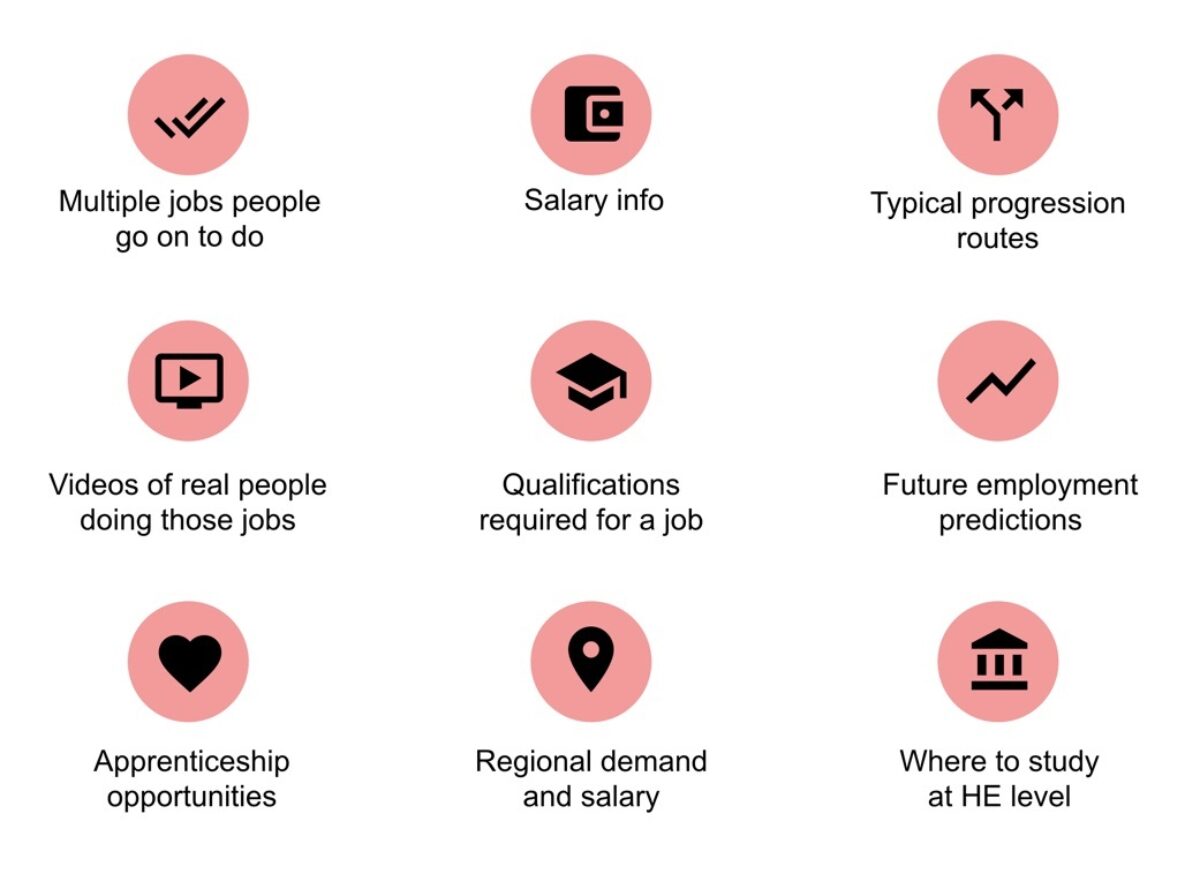In November 2018 we ran a workshop at the College Marketing Network’s annual conference looking at how to use Labour Market Information to engage prospective students. We highlighted our own experiences and discussed why we built Pathways. This article aims to give an overview of that session.
We launched Pathways in the summer of 2018. I want to start with a brief history of how we got to that point.
A little bit of history
Tim and I founded our digital agency Float in 2003. Over these 15 years we’ve worked predominantly with clients in the education sector, building all kinds of things that exist online. Websites for colleges, careers focused resources for young people and other interesting projects like the real-time multiplayer stock market simulation for students that we made for Global Investor.
We have quite lot of experience working in this sector, making digital products that engage with a younger audience. It was in early 2017 that we began looking at Labour Market Information in much more detail.
We’re the development team behind the Careerpilot website. We did a major overhaul of the service in 2017 and spent a lot of time researching and reviewing different tools, services and ways to extract and present LMI, careers and progression information to a student audience.
We also performed a big review of college websites that year and started to see a small number of colleges beginning to integrate LMI into their course marketing pages. It was really exciting to see this type of data on their websites - it seemed to put them way ahead of the competition, as you could clearly see that doing one of their courses could lead to a particular career. But we also felt there was scope to do so much more.
It was around November 2017 that we also made a prototype web application using Labour Market Information, where we looked at the new T-level programmes and mapped these to occupation data. It was our first attempt to integrate with various data sources and present career and progression information in a way that would engage with a younger audience
As such, over the last 18 months we’ve done a lot of research and integration with Labour Market Information from numerous sources and I think wholeheartedly we see the value in making this type of data accessible to students and their parents.
The importance of Labour Market Information
"Every learner, and their parents, should have access to good quality information about future study options and labour market opportunities."
The Gatsby Good Career Benchmarks for young people in colleges
In the past year, we’ve seen recommendations coming to make LMI more accessible. Recent government strategy documents highlight the necessity to make high quality LMI much more accessible and open - to help inform future choices. The above quote is from the Gatsby Benchmarks where the use of LMI data is one of their 8 benchmarks (Learning from Career and Labour Market Information). And the recent Department for Education Career Guidance for FE and Sixth form colleges also stresses its importance.
So we get it. We understand this is important!
And it’s important for colleges too. There are many ways you can use occupation and progression data to engage and to inform.
Not only for careers education. But also from a marketing perspective - to sell your courses to prospective students and their parents.
Going to college
So why is it that students actually go to college? To learn, because they’re interested in a particular subject, for the student experience, or because their sister or cousin went there?
Or do they choose a particular college course because they want go on to be an engineer, or a midwife, or work with animals.

Students see college as the best way to get the right training and qualifications that will lead to a job they want to do.
Someone doesn’t enrol on a Health and Social Care course because that’s their goal. It’s because they want to be a nurse, or a midwife, or a care worker.
College is only the beginning of their journey. Not the actual destination but a means to help them get to where they want to go. To give them the skills, the qualifications and to help them get the job they really want.
Therefore the way you market your courses should look beyond the course and map to the careers students go on to do. To show progression, to demonstrate how doing your course can help them achieve their goal. To set the bar and give them something to aspire to.
How does LMI help?
Clear and high-quality Labour Market Information can really help students and their parents make informed choices about what to do next. It can present many options that they don’t event know existed.
We’re talking here about using Labour Market Information as marketing material to engage prospective students. Not in a careers section, or as a careers resource only for existing students. But out front and centre, integrated into your course marketing pages. Showing clear examples - if you study at our college on this course, you could progress to further study and have this career. Earning this amount of money, with these prospects.
By integrating Labour Market Information you’re adding marketing collateral to your courses, you’re adding value.
But it’s really hard
But we know this is really hard. It’s a huge task!
Form our own experiences and from talking to our college clients, the task of manually researching and mapping LMI data to all of your courses is an almost unimaginable task!
The process of finding relevant, up to date, and regional data for related jobs, for all of your courses, can just feel like an impossibility.
Which is why we frequently see this type of progression information on college course pages:
Successful completion of this course can lead to job x, job y or job z.
It’s very dry and a bit light. No real sense of how to do this, or a sense of something to aim for. And will there actually be any of these jobs in 2-3 years when they’re qualified?
It’s not that we’re saying this is doing it wrong. We just understand how hard it is to do this properly.
A better way
What if you could show the jobs people go on to do. Actual jobs based on real progression data. With salary information, predicted employment figures both nationally and regionally.
The qualifications you need for a job and typical progression routes for getting there. And maybe with videos of real people talking about doing that job.

If this was all mapped to your courses, embedded directly in each of your course pages. And by virtue of being there, having this high-quality data accessible, helped your college meet Gatsby Benchmark #2.
Our research
Through our own research and early work with Labour Market Information we knew there was a whole load of accessible data.
We had reviewed other careers and progression tools and whilst knowing these services existed, we we still were pretty convinced that the sector was missing an affordable LMI tool.
One that was in context to the specific course page a user was looking at, mapped directly with real data. That doesn’t take you off to a different website. And a tool where it would all be automated - it didn’t need a marketing team to have to do their own mapping.
Young people
Through the work we do, we spend a lot of time in schools and colleges observing and testing with 14/15/16 year olds. Watching them use websites and other digital tools.
Whilst many people think the “younger generation” are tech savvy, that’s not necessarily true. Perhaps with Playstation gaming, or Snapchat, or Instagram. But they have less experience of using the internet to find out information. To do research. They’re not necessarily confident in navigating their way around often complex websites.
There is so much LMI and career data accessible to us that we need to understand what is important and present it with clarity. It should provide real insights, not just stats and numbers and be something that young people can relate to. It should mean something to them.
Which means it must be engaging and simple. And be something that is actually of interest to young people!
Pathways
The result of this research and building on our knowledge and experience we developed Pathways.
Pathways shows progression options from the courses your college provides to the careers students can do.
It maps your subjects and courses to HE and future careers and shows Labour Market Information, study options and videos of real people talking about their jobs.
- Based on real data from HESA, LMI for All and Unistats
- Maps A Levels and BTECs to Foundation Degrees, HNCs, HNDs and Degrees
- Over 800 careers videos from icould, with real people talking about their job
- Regional LMI data for each occupation
- 26 job sectors mapped to over 350 occupations lets your students see potential careers in their area of interest
- Embedded directly in your own course pages
A case study
As part of our workshop session at the College Marketing Network conference we were joined by Georgia Watt from the marketing team at St Brendan’s Sixth Form College. She presented an overview of the process they had been through to integrate Labour Market Information into their course pages, highlighting the struggles of trying to do this internally within an already busy team.

Georgia gave an insight into their usage of Pathways and the benefits it had brought to their marketing team and to the college overall.
- Encourages more focused conversations
- Offers prospective students/parents more detail about destinations
- Adds value to courses
- Reassures parents about subject choices
- Allows the marketing team to talk more confidently about careers / progression to prospective students
- Establishes us as a stepping stone to success
- Helps us meet Gatsby Benchmark #2!

It was both reassuring and satisfying to see staff, prospective students and parents all engaging with this one tool during open events. Pathways is versatile and adds significant value to conversations across the College
St Brendan’s Sixth Form College
What next?
After our workshop we had lots of interesting conversations with people from college marketing teams across the country. Hearing about their own, often shared experiences, and agreeing the value of presenting high quality Labour Market Information to prospective students.
If you’d like to hear more about this workshop then please let us know.
If your college, school or careers team would like to talk further about integrating Labour Market Information into your website and to understand how Pathways can help then we’d love to have a conversation. We can give you a live demo of Pathways and answer any questions you may have.






